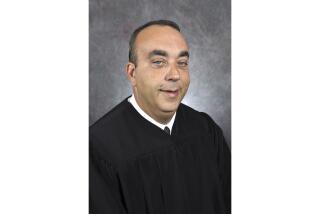3 Killed in Iraq May Be Islamist Link
Three gunmen killed in a fierce firefight with American troops in northern Iraq on Monday were suspected of having belonged to a radical Islamist group with possible links to Al Qaeda, the U.S. military said.
If the suspicions are borne out, it would be a fresh reminder that elements loyal to the toppled regime of Saddam Hussein are not the only forces confronting U.S. troops in Iraq.
Guerrilla opposition to the American-led occupation is believed to be orchestrated primarily by the remnants of forces with allegiance to Hussein and his Baath Party, most of them Sunni Muslims with tribal links to the former leader.
However, the group implicated by U.S. military officials, Ansar al Islam, is a fundamentalist Taliban-style organization with roots in the Kurdish north whose ranks, though relatively small, are believed to include fighters from other Muslim nations.
Monday’s exchange of fire in the northern city of Mosul erupted as U.S. troops were conducting house-to-house searches, looking for fugitives and illicit weaponry.
Mosul, together with the cities of Samarra and Tikrit, north of Baghdad, has been a focal point of such American raids, particularly in the wake of Hussein’s capture Dec. 13.
U.S. military officials said soldiers from the Army’s 101st Airborne Division, headquartered in Mosul, came under fire with automatic weapons and at least one hand grenade as they attempted to enter a house where they believed a wanted man might be hiding.
Two American soldiers were wounded in the ensuing gun battle that left the three suspects dead, said Sgt. Robert Woodward, a spokesman for the division.
Inside the house, troops found $30,000 in Iraqi dinars, together with an arms cache consisting of rocket-propelled grenades, hand grenades, a submachine gun, assault rifles and ammunition, he said.
He and two other military officials, who spoke on condition of anonymity, said the three dead men’s connections to Ansar were still under investigation but that evidence had been uncovered that suggested a link with the group. All three officials declined to provide any specifics.
There have been indications elsewhere, however, that Hussein loyalists are not the only ones staging attacks against the U.S.-led coalition and its appointed Iraqi government.
Last week, after a deadly car bombing in the Kurdish city of Irbil -- which had been relatively free from the constant round of guerrilla attacks in north-central Iraq -- several local officials said the explosion might have been the work of foreign Islamic extremists.
On Sunday night, in the northern city of Kirkuk, police said they had arrested four foreigners -- two Egyptians, an Afghan and an Iranian -- suspected of playing a part in the insurgency and had handed them over to American troops.
Over the past two months, Mosul has been increasingly restive -- a pattern that shows no sign of changing.
On Monday, troops defused a roadside bomb that had been planted at a busy traffic interchange. In addition, a U.S. convoy came under fire by rocket-propelled grenades, which caused no casualties, the military said.
In a separate development, two London-based Arabic-language dailies quoted a member of the Iraqi Governing Council, Iyad Allawi, as saying that under interrogation, Saddam Hussein had told his captors he had stashed billions of dollars in foreign bank accounts during his reign.
The former leader was providing interrogators with information about the identities of those who knew where the funds were, Allawi told the newspapers Al Sharq al Awsat and Al Hayat.
Iraqi authorities have estimated that about $40 billion in money controlled by the former regime cannot be accounted for, and they are keenly interested in establishing its whereabouts.
In Washington, however, a U.S. official familiar with the interrogation of Hussein said the account of Hussein admitting to sending billions of dollars abroad is “flatly wrong.” The official declined to be identified.
Other members of the Governing Council also voiced skepticism about Allawi’s reported assertions.
Ahmad Shyaa Barak told Associated Press that he had been told by knowledgeable officials that Hussein, under questioning, was offering information about the anti-American insurgency and its leadership -- a statement echoed by American military officials -- but had not disclosed information about the missing funds and how to trace them.
Allawi was out of the country, according to an aide, and could not be reached for comment.
Times staff writer Paul Richter in Washington contributed to this report.
More to Read
Sign up for Essential California
The most important California stories and recommendations in your inbox every morning.
You may occasionally receive promotional content from the Los Angeles Times.










